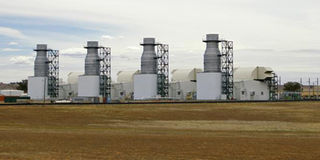Lack of natural gas stalls operations of three fertiliser plants

What you need to know:
Natural gas is the main and preferred feedstock in the manufacturing of urea fertilisers. The three companies are Helm AG of Germany, Ferrostal Industries Project GmbH of Germany and Capital DW Fertiliser Company of Egypt.
Dar es Salaam. Three fertiliser manufactories find it difficult to start their operations due to a lack of natural gas in their operations, The Citizen has learnt.
Natural gas is the main and preferred feedstock in the manufacturing of urea fertilisers. The three companies are Helm AG of Germany, Ferrostal Industries Project GmbH of Germany and Capital DW Fertiliser Company of Egypt.
The Citizen understands that in 2016, Helm AG Company of Germany showed interest in setting up a $1.5 billion (about Sh3.3 trillion) fertiliser plant in Tanzania and that the company was allocated 400 hectares for developing the project in Mtwara.
The plant is expected to produce 2,200 tonnes of ammonia and 3,850 tonnes of urea. Similarly, Ferrostal Industries Project GmbH, has registered $1.9 billion (about Sh4.2 trillion) fertiliser project at TIC but things have been moving at a snail’s pace.
The Tanzania petroleum Development Corporation (TPDC) says natural gas was there but they had not yet agreed on the price.
TPDC acting managing director Kapuulya Musomba told The Citizen that the agreed price still seems too expensive for fertiliser companies to operate profitably.
“After prolonged discussions between government and the companies, they (fertiliser companies) have agreed to purchase natural gas at $2.6 per cubic feet,” he said.
He said however that the price was still too high for the companies to make meaningful business from there and thus the need for the government to issue subsidies. “Natural gas will be used as energy to power the factories. It will also be used as raw materials to produce fertilisers especially Urea,” he said noting that if the price of remains at $2.6, the price of fertiliser will also rise when actual production starts.
Tanzania Gas Supply Company acting general manager Balthazar Mrosso said though the coming of fertiliser companies will raise usage of natural gas, the available infrastructure was not conducive to the extraction of natural gas and oil in the country.
“At the moment gas supply is ahead of demand but we are currently counting on these fertiliser plants as per the industrialisation drive,” he told The Citizen.
According to him, at the moment, the natural gas is used mostly to generate electricity and heating uses in industries while a smallest portion is consumed in cars and cooking.
The uses make a total demand of about 300mcf (million cubic feet) per day, well below the production capacity of 350mcf of the Madimba and Songosongo gas plants only,
“You find that, there are total of 49,243 industries in the country, according to latest industrial census in 2013, but only 37 of them are currently use natural gas,” he said, adding that the demanding opportunity is still high.
According to the national census of 2012, only 70 houses had been connected with CNG and other 30,000 are set to be connected in Dar es Salaam.
“We wish that fertiliser plants could start operating as soon as possible to meet the demand, but we also need to increase the number of industries and institutions, houses and cars,” he said.
He added that, the natural gas supply is well enough to accommodate the needs. So far about 27.25tcf (trillion cubic feet) has discovered and reserved, waiting for being extracted and distributed for various uses.




